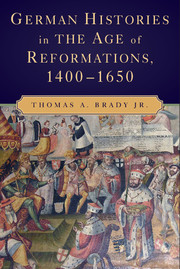Book contents
- Frontmatter
- Contents
- Figures, Maps, and Tables
- Acknowledgments
- A Note on Usages
- Map 1 The Empire in 1547
- Map 2 The Peace of Westphalia, 1648
- Part I The Empire, the German Lands, and Their Peoples
- Part II Reform of the Empire and the Church, 1400–1520
- Part III Church, Reformations, and Empire, 1520–1576
- 9 Urban Reformations
- 10 A Revolution of the Common Man
- 11 Imperial Reformations in the Age of Charles V
- 12 Imperial Peace, 1555–1580
- Part IV Confessions, Empire, and War, 1576–1650
- Appendix
- Glossary
- Bibliography
- Index
9 - Urban Reformations
Published online by Cambridge University Press: 05 June 2012
- Frontmatter
- Contents
- Figures, Maps, and Tables
- Acknowledgments
- A Note on Usages
- Map 1 The Empire in 1547
- Map 2 The Peace of Westphalia, 1648
- Part I The Empire, the German Lands, and Their Peoples
- Part II Reform of the Empire and the Church, 1400–1520
- Part III Church, Reformations, and Empire, 1520–1576
- 9 Urban Reformations
- 10 A Revolution of the Common Man
- 11 Imperial Reformations in the Age of Charles V
- 12 Imperial Peace, 1555–1580
- Part IV Confessions, Empire, and War, 1576–1650
- Appendix
- Glossary
- Bibliography
- Index
Summary
Had I but Venice's might
Augsburg's splendor,
Nuremberg's skill,
Strasbourg's cannon,
And Ulm's money,
I would be the richest man in the world.
Traditional sayingThe citizen's first duty is unrest.
Günter GrassOne day in 1524 an Augsburg ropemaker named Ott was overheard to curse “the dishonorable priests and the rich …, who pile up goods and money and keep the truth from us. We have always been evangelicals, and we still are today, but, truly, we have been fed many lies. If we truly followed the gospel, we would all have to be like brothers.” At the center of the unprecedented storm of words and deeds that broke over the German cities during the first half of the 1520s stood precisely Ott's principle: Christians follow the Gospel as brothers. In this evangelical movement, collective hopes of a better, more just future mingled with personal hopes of salvation. For this reason, and because for a while the cities became the nurseries and schoolhouses of religious change, it is hardly going too far to say that the Protestant reformation was, at least in its youth, “an urban event.” The cities served the whole society as concentrated points of knowledge, technology, literacy, wealth, communication, and power. In their milieus new ideas could gain a hearing and new practices support. Secure within their walls could take place the mobilization of movements for change.
- Type
- Chapter
- Information
- German Histories in the Age of Reformations, 1400–1650 , pp. 161 - 184Publisher: Cambridge University PressPrint publication year: 2009

